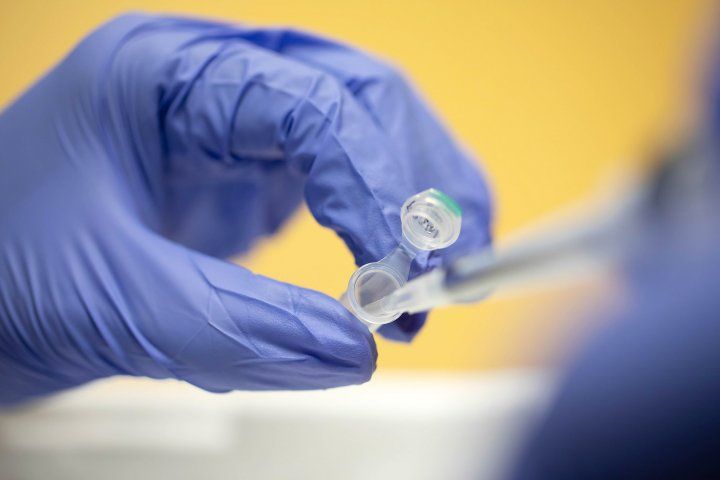Free Genome Sequencing Now Available to all UCSF Patients
Nation’s Most Comprehensive Whole-Genome Screening Program Will Advance Inclusive Precision Medicine Across UCSF Health

UC San Francisco scientists have launched a precision medicine initiative to offer free voluntary whole genome sequencing to all UCSF Health patients – making it the most comprehensive program of its kind in the nation.
The goal of the initiative, called the UCSF 3D Health Study (for “Data, Discovery, and Diversity”) is to build a genomic database that matches the diversity of UCSF Health’s patient population in order to broaden scientists’ understanding of the genomic variations underlying health and disease and help ensure that precision medicine at UCSF serves all people.
“We need to be able to identify and respond to diseases much earlier than we are now using preventive therapies based on deep understanding of disease biology. Central to that is having genetic data on a diverse spectrum of patient populations that can teach us how to keep everyone well rather than responding in crisis when they become ill,” said UCSF Chief Genomics Officer Aleks Rajkovic, MD, PhD, medical director of the UCSF Health Center for Clinical Genetics and Genomics, who is leading the new initiative.
Other U.S. health centers offer genotyping screens akin to 23andMe, which look for specific known markers of genetic variation, or else sequence panels of specific genes associated with particular diseases. In contrast, the UCSF initiative will sequence the entire genome of any UCSF Health patient who signs up for the study, which can be done at the initiative’s website, 3dHealthStudy.org.
Patients who participate in the initiative will receive reports on their genetic ancestry as well as actionable genetic risk factors for selected diseases including cancer, cardiovascular disease and neurological disease. The initiative will only report findings for which there are clear clinical guidelines and management options that will allow UCSF Health providers to work with patients to reduce their health risks in a meaningful way.
“We’re strong believers that if you’re going to do genetic research using patient data, patients should benefit by getting results on valuable insights from the data,” said Elad Ziv, MD, a professor of medicine at UCSF and a lead primary care physician of the project. “To begin with, we are focusing on a very specific list of actionable risk factors, but hope that as we expand this initiative we can add reports on genetic variants in drug response, polygenic risk scores for certain diseases, and other information that will be useful for patients and their medical teams.”
“Importantly, not only will clinically relevant results be returned to individual patients, but the data will also serve as a unique and invaluable resource to the research community as a whole,” added Keith Yamamoto, PhD, director of UCSF Precision Medicine and UCSF Vice Chancellor for Science Policy and Strategy. “The 3D Health whole genome data will be de-identified and integrated into a secure biorepository that includes de-identified clinical, social and behavioral information, and analyzed in our precision medicine knowledge network, SPOKE, an AI-powered computational tool that will enable researchers and clinicians to define the underpinnings of health and the genetic and environmental determinants of disease across our diverse patient population.”
The study has adapted to the COVID-19 pandemic by going completely contactless – informing patients about the study, obtaining consent, shipping DNA-collection kits to their homes, and processing the tests without requiring any in-person interaction.
“One of the greatest challenges facing genomic precision medicine is that the vast majority of genetic and genomic studies have focused on a very small slice of the population: mostly male, white, and high socioeconomic status. As a result, our genomic data is the worst for the most medically underserved populations,” said Sawona Biswas, MS, LCGC, the director of the 3D Health project and scientific and clinical lead for genomics administration at UCSF. “This is what we want to change with this study, In particular, we hope our contactless approach can improve our ability to benefit a more diverse group of people who we might not reach through our clinics alone.”
Recruiting diverse participants is challenging due to structural biases in the American health care and health research systems. This project is working with the Special Populations for Health Equity in Research and Education (SPHERE) Committee, which consists of diverse community leaders and a UCSF team with experience with diverse research participants.
“We are building a partnership with the 3D Health Study Team to help with recruitment of diverse patients and to learn how to address issues like mistrust, structural racism, and unequal access in research,” said Paula Fleisher, MA, program manager of SPHERE, senior staff of the UCSF Clinical & Translational Science Institute (CTSI) Community Engagement and Health Policy Program and associate director of the UCSF Center for Community Engagement.
“It’s a unique collaborative learning process that we hope will ultimately lead to equity in health and healthcare through precision medicine for our diverse communities,” said Monique LeSarre, PsyD, executive director of the Rafiki Coalition for Health and Wellness and a member of the SPHERE Committee representing the African American Community Health Equity Council.
Rajkovic added, “Diversity is essential to the fabric of UCSF. Ultimately, underrepresentation of any group compromises the delivery of health care.”
UCSF Health patients may visit 3Dhealthstudy.org for more information or contact the study coordinators at [email protected].
The University of California, San Francisco (UCSF) is exclusively focused on the health sciences and is dedicated to promoting health worldwide through advanced biomedical research, graduate-level education in the life sciences and health professions, and excellence in patient care. UCSF Health, which serves as UCSF’s primary academic medical center, includes top-ranked specialty hospitals and other clinical programs, and has affiliations throughout the Bay Area.